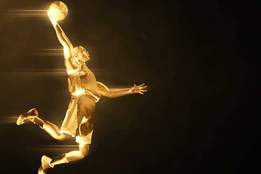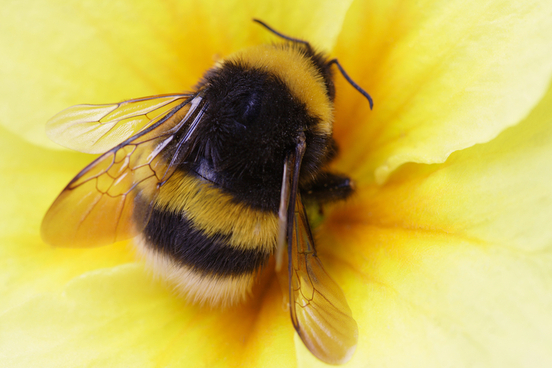
Dumbledore
Sometimes, the connection between a borrowed name and the character that bears that name isn’t always clear. Dumbledore, the name given to the headmaster of Hogwarts and one of the preeminent wizards of the Potter universe, is an 18th-century word for a bumblebee:
What is the burnie-bee? Is it not the humble-bee, or what we call the “dumble dore,”—a word whose descriptive droning deserves a place in song?
—Robert Southey, letter, 12 March 1799
Dumble- was a prefix that was used to refer to various insects, and it has close cousins in humble-, bumble-, and dummel-, which some etymologists tie to dumb. Dore, or dor, is a word that dates back to almost 700 AD and refers to bees or flies. Bumblebees, with their bobbing, wavering, slow flight, might have looked dull or lazy, which accounts for the combination of dore and the dumb-adjacent prefix dumble-.
What about Rowling? Is she somehow implying that Albus Dumbledore is lazy or dull? Not at all:
“Dumbledore” is an old English word meaning bumblebee. Because Albus Dumbledore is very fond of music, I always imagined him as sort of humming to himself a lot.
—J.K. Rowling, in interview with Christopher Lydon on “The Connection”, WBRU Radio, 12 Oct. 1999

Muggle
The Harry Potter world is divided into the magical and the mundane, and J.K. Rowling created an entire vocabulary to separate the wizarding world from the Muggle world. Among those words was Muggle. A Muggle is a non-magical person. It's a noun ("The Dursleys are Muggles") and can be used attributively (as in "the Muggle world," above). According to the Oxford English Dictionary, Rowling coined Muggle and probably based it on the earlier noun mug, which refers to a foolish or stupid person (though it goes without saying that foolishness or stupidity is not a hallmark of Muggles).
But Rowling wasn't the first to coin the word muggle. There is an earlier muggle that is no longer used: it was a synonym of sweetheart.
Oh the parting of vs twaine
Hath causde me mickle paine, and I shall nere be married
Vntill I see my muggle againe.
—Thomas Middleton, Your Fiue Gallants As It Hath Beene Often In Action At The Black-Friers, 1608
We're not quite sure of where this muggle originated, because it was fairly informal—one 1622 treatise on domestic duties warns husbands against calling their wives by "names more befitting beasts then wiues, as Cole, Browne, Muggle, &c."—and it not particularly long-lived. It had passed out of use by the 1700s.
Rowling's Muggle may end up sticking around longer than the earlier muggle, though: it's already gained a more general use that refers to a person who seems to have no supernatural or superhuman skill or ability:
The twin microchips implanted in the webbing of her left and right hands are keys and wallet, compressed into glass capsules the size of rice grains. ... Now, like a Jedi, she has the power to wave through doors that we muggles would need to open by key fob.
—The Telegraph-Journal (New Brunswick), 29 Aug. 2016
or a person who doesn't have expertise or experience in a field:
You always get what I would call "muggles"—people who aren't in the fell burlesque community. They always want to come.
—Fi Rooney, quoted in The Daily Mirror (Ireland), 17 July 2016

Squib
In the Potter universe, there is a person who straddles the line between the wizarding world and the Muggle world, and that is a squib. Squibs are people who are born to wizarding parents, but who have no magical abilities of their own. In the Harry Potter world, squibs are rarer than wizards and witches who are born to Muggle parents.
Much like Muggle, the Potteresque squib shares space with an older squib, but unlike Muggle, Rowling's squib and the real-world squib are related.
The word squib first entered English in the 16th century, and one of its earliest meanings was "a firecracker." (Yes, there were firecrackers in 16th-century England—fireworks themselves go back to ancient China.) Squibs in the 1500s were not much different technologically speaking from firecrackers today: small paper tubes filled with gunpowder.
The word squib gained several new meanings very early on: a small firework that goes off with one flash of light and is over before you even realize it's begun certainly lends itself to lots of metaphorical comparisons to disappointment. One early meaning was for a petty or insignificant person, likely based on the smallness of the firecracker:
They are all of them but a sort of beggars and squibbes, puppies, dogs, dunghill churles. Yea, even the proudest of them came hither with their hose patched on their heels.
—Adam Loftus, letter to Lord Burghley, 4-14 Dec. 1586
The tie between the word squib and disappointment only grew as time went on: the phrase damp squib was coined later to refer to someone or something that promised much, but delivered very little:
We don’t like to believe that we have taken so much time and trouble with nothing but a damp squib after all. No one is sorry for us, of that we are quite aware. But we feel very sorry for ourself [sic].
—The National Magazine, 1863
Damp squib is more common in British English , which is Rowling’s native dialect, than it is in American English, and it is likely that she borrowed on both the sense of disappointment as well as the insignificance of the squib when she decided to use the word for those who had great magical potential, but turned out to be duds.
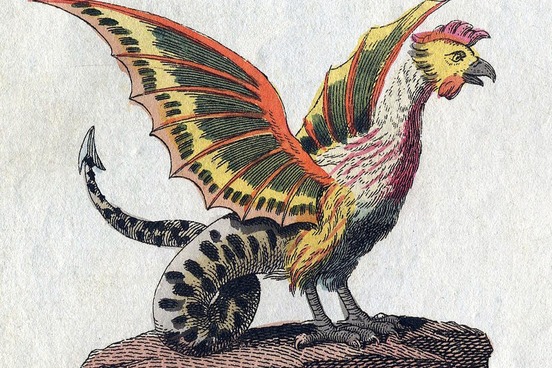
Basilisk
Most people know that some of the creatures mentioned in the series, from unicorns to werewolves, weren’t invented by Rowling, but they give her credit for creating creatures that have actually been discussed for hundreds of years.
One such creature is a major player in Harry Potter and the Chamber of Secrets: the basilisk. The basilisk (also called a cockatrice in medieval mythology) goes back to medieval Greece and Rome; it is supposedly a serpent hatched from a chicken’s egg, whose hissing drives away all other serpents, and whose look (and breath!) were fatal. (In the Potter universe, those who see a basilisk indirectly—reflected in a mirror or a puddle, for instance—are not killed outright, but are merely turned to stone.)
The word basilisk showed up in English in the 1300s, and comes ultimately from the Greek word basileus, which means “king” (likely because in the ancient world, the basilisk purportedly had a spot or a crest shaped like a crown on its head).
The basilisk was a creature that a variety of writers used, from Shakespeare ("It is a basilisk unto mine eye / Kills me to look on't." —Cymbeline, ca 1611) to Dickens, who compared a housemaid to the deadly serpent ("But to be quiet with such a basilisk before him was impossible." —Barnaby Rudge, 1841). But the basilisk isn’t all mythology and metaphor: we borrowed the word to refer to a particular North American lizard that is in the same family as iguanas, and which can inflate and deflate a crest on its head at will.
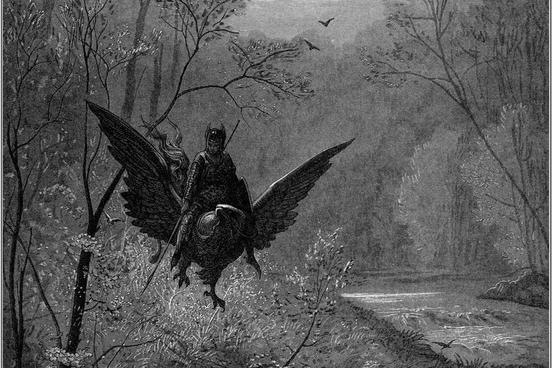
Hippogriff
As for the magic in the books, about one third of it is based on what people used to believe and about two-thirds I invented. The dementors are creatures I made up, but the hippogriff is something people used to believe existed.
—J.K. Rowling, quoted in The Boston Globe, 18 Oct. 1999.
We’re introduced to the hippogriff in book three of the series, Harry Potter and the Prisoner of Azkaban. As Rowling explains, a hippogriff is a creature that is part horse and part griffin (which is, itself, part eagle and part lion), and the hippogriff first is discussed in ancient Greek mythology. In spite of this, the word hippogriff didn’t show up in English until the 1600s, when the hippogriff was featured in a very well-known Italian epic poem called Orlando Furiosa. In the poem, the wandering knight Ruggiero rides a hippogriff (which is more like an eagle-headed pegasus than Potter's Buckbeak).
Orlando Furiosa brought the hippogriff back from the pages of antiquity, and it occasionally featured in 19th-century heraldry. The word is a blend of the Greek ippo- (which is related to the Greek hippos, or “horse”) and grifo (which is from the Latin gryphus and which means “griffin”).

Nagini
Rowling didn’t just pull creatures from Greek and Roman mythology. The large snake that accompanies Voldemort, Nagini, shares a name with the great semi-divine serpentine creatures that are sometimes worshiped (and sometimes feared) in Hindu, Buddhist, and Jain mythology. The name Nagini is the feminine form of the Sanskrit word nāga, which means “snake." The Sanskrit word was borrowed into English in the late 1700s, and showed up in translations of Buddhist and Hindu texts.
Naga also came to be used in English of snakes, and particularly the cobra. In fact, one of the taxonomic genera that cobras belong to is Naja, a Latinization of the Sanskrit nāga.
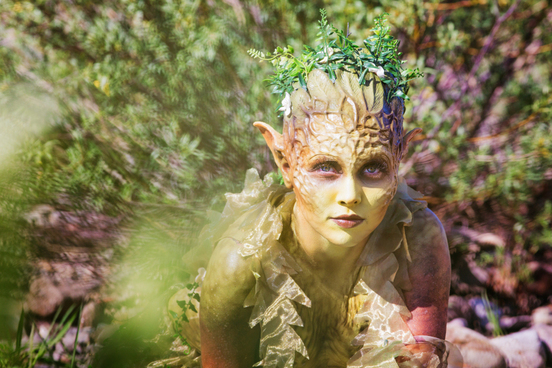
The English Imps
Of course, Rowling drew from the rich tradition of English sprites and imps when crafting the Potter universe. Both grindylows (malevolent water creatures with long, spindly fingers who excel at drowning people) and boggarts (ghostly beings which take the form of your deepest fear) are right at home in the Harry Potter world, but came from older English folktales:
Aqueous nymphs, or nixies yclept Grindylow and Jenny Green Teeth lurked at the bottom of pits, and with their long sinewy arms dragged in and drowned children who ventured too near.
—John Higson, Historical and Descriptive Notices of Droylesden, Past and Present, 1859
The original grindylow comes from the folklore of Lancashire, a region in the northwest of England. The word doesn’t have much use apart from in these 19th-century collections of folktales, though our earliest use of grindylow in print comes from a Manchester newspaper in 1852.
Rowling’s boggarts are perhaps a subclass of the original boggart, which dates back to the 1500s and is used to refer merely to a ghost:
Of boggarts the Rev. William Thornber observes that there were several different kinds, having their haunts in that part of the Fylde near Blackpool; as, for instance, the wandering ghost of the homicide or the suicide; that of the steward of injustice, or that of the victim of a cruel murder; again the lubber-fiends, the horse-boggarts, and the house-boggarts, or industrious, yet mischievous imps, haunting dwellings.
—John Harland and T. T. Wilkinson, Lancashire Folk-Lore: Illustrative of the Superstitious Beliefs and Practices, Local Customs, and Usages of the People of the County Palatine, 1867
Boggart appears to be related to the Middle English word for a scarecrow.
Cornish pixies, small, mischief-making creatures, are also borrowed into the wizarding world from muggle tales. The word pixie came into English in the 1500s from southwest England, where Cornwall is—though our early evidence for the word in print comes more from Devonshire, the county next to Cornwall:
I shall by some be thought to lead you in a pixy-path by telling an old tale.
—Thomas Wescote, A View of Devonshire in 1630, (1636) 1845
Pixies are small, humanlike creatures that make mischief; their name may be related to the earlier English word puck, which refers to an evil or malicious sprite and which has been in English for over 1,000 years.
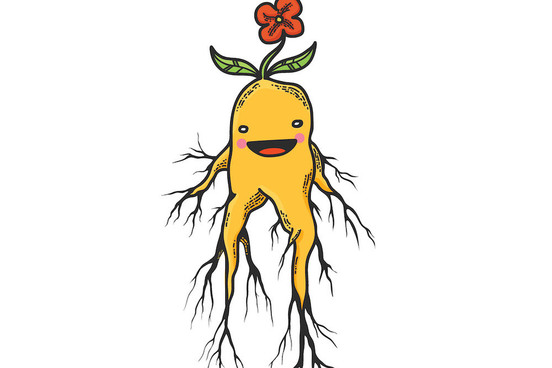
Mandrake
Rowling’s use of folklore isn’t limited to creatures:
“Mandrake, or Mandragora, is a powerful restorative,” said Hermione, sounding as usual as though she had swallowed the textbook. “It is used to return people who have been transfigured or cursed to their original state.” ... “The cry of the Mandrake is fatal to anyone who hears it.”
—Harry Potter and the Chamber of Secrets, 1999
The word mandrake came into English in the 14th century to describe a root that supposedly had magical properties. (Hermione was, as usual, beyond right about the mandrake: the word mandrake is actually a shortening of mandragora, an earlier name for the plant that comes from Greek.) Early medieval physicians claimed that the name came from the peculiar shape of the forked root:
...poetes clepeþ it antropomos for þe roote...is somdel y-schape as a man [...poets named it ‘antropomos’ for the root is somewhat shaped like a man].
—John Trevisa, translation of Bartholomaeus Anglicus' De Proprietatibus Rerum, ca. 1398
Mandrake is part of the nightshade family, which means it (like other nightshades) can be poisonous. All these tidbits of information combined to create a huge amount of superstition around the mandrake. From ancient times, it was believed that mandrakes would cry when pulled from the ground, and anyone who heard the cry of the mandrake would be killed instantly. Ancient physicians, then, suggested that mandrakes be harvested by tying a cord around the plant and attaching that cord to a dog, who would then pull up the plant and die instead of its master. (No dogs were actually harmed in the harvesting of mandrakes). Other superstitions arose in the Middle Ages: that the plant had to be harvested by moonlight, or couldn’t be touched by human hands.
Regardless of the (supposedly) magical qualities of the mandrake, it was used in medieval medicine to increase fertility as well as induce sleep or a narcotic stupor, and it was sometimes prescribed (as it was in the De Proprietatibus Rerum) as a cure for possession or madness. In the Potter universe, mandrakes are best known for their use in potions, and particularly in potions which restore those who have been petrified (or turned to stone).
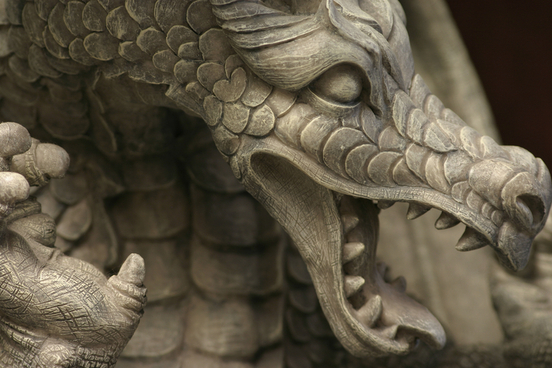
Bellatrix and Draco
Bellatrix Lestrange is Narcissa’s sister, a fiercely loyal (and notorious) servant of Voldemort:
I was and am the Dark Lord's most loyal servant. I learned the Dark Arts from him, and I know spells of such power that you, pathetic little boy, can never hope to compete!
—Harry Potter and the Order of the Phoenix, 2003
Her name also goes back to ancient Rome, where it appears in the Aeneid to describe a woman warrior. The Latin word bellatrix is the feminine form of the Latin word bellator, which means “warrior”; both belletrix and bellator stem from the Latin word for war, bellum. Bellum might look familiar to you: it shows up as a root in English words like bellicose (“warlike”), belligerent (“aggressive”), and antebellum (literally, “before the war”).
Unlike the other bellum words, bellatrix did not survive with its general meaning of “woman warrior,” but it did gain a very specific meaning in the early Middle Ages: it was used to refer to a star. Bellatrix, which is also called Gamma Orionis, is the third brightest star in the constellation of Orion, and is one of the stars used in celestial navigation . The star likely gained its name as a Latin translation of the Arabic name for the star, al-najid, meaning “the conqueror.”
Draco Malfoy is Harry’s contemporary and the only son of Lucius and Narcissa. Like Lucius, Narcissa, and Bellatrix, Draco’s name has roots in ancient Greece. Draco was the first recorded lawgiver of ancient Athens, and his code of laws dates back to the 7th century BC. His legal code was incredibly harsh, however: trivial crimes like stealing a cabbage were punishable by death, and debtors who were of a lower social class than their creditors were forced into slavery. Almost all of his laws were repealed in the early 6th century BC, and his name lives on in the word draconian, which means “cruel” and “severe.”
Draco is also the Latin word for “serpent,” and the origin of the word dragon. The Latin name was given to a constellation that is circumpolar (or, that is always visible above the horizon), which means that both Bellatrix and Draco are visible in the northern hemisphere's night sky. (Both the celestial Bellatrix and Draco were named long before the Harry Potter series appeared.)
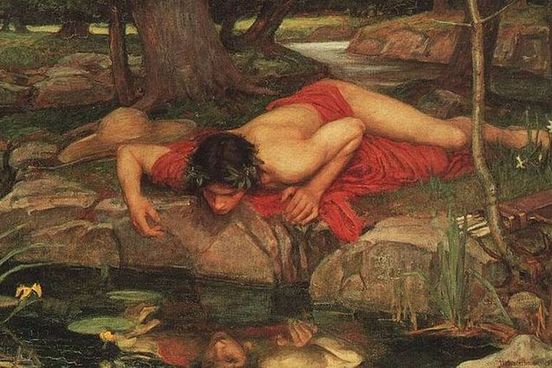
Lucius and Narcissa
Rowling gives a sense of history in her world with the use of names, and especially the names of older witches and wizards, or of old wizarding families. Take, for instance, one of the most prominent wizarding families in the entire series: the Malfoys. The names that Rowling chose for them sound antiquated and like they have been passed down from generation to generation. That’s because many of those names have historical and real-life use.
Lucius is a first name that dates back to ancient Rome, where it was a common first name derived from the word for “light” (lux). A number of historical Luciuses were powerful politicians and dictators, and Lucius Malfoy is no different: he is the head of a dynasty who uses his power and political standing to assist Voldemort. (You can read about the many historical Luciuses at Encylopaedia Brittanica.)
Lucius’s wife is Narcissa, another name borrowed from the ancient world. In Greek mythology, Narcissus was a beautiful man who fell in love with his own reflection in a pool of water. He was so consumed with love for his image that he refused to leave the pool and died. His name is the basis for the word narcissism, which generally refers to excessive egotism, but which can also refer to a psychological condition. Narcissa is the feminine of Narcissus, and there are hints of egotism in Narcissa Malfoy, who seems to be more concerned with the protection of her own family and interests than with doing whatever it takes to see Voldemort come to power.

Arithmancy
The most important feature of the wizarding world is not it flora or fauna, but magic itself. Divination, charms, potions, alchemy: all of these are words that we’re familiar with, and words that we already associate with magic. But there are other magical words Rowling uses that may pass you by.
Arithmancy is one such word. It is, as any fan of the books will tell you, Hermione’s favorite subject: it is divination using numbers and numerology. The word dates back to the 1500s and is a combination of arithmetic and the suffix -mancy, which means “divination.” Arithmancy wasn’t just fictional: there are numerous 17th-century records stating that arithmancy was not just magical, but also religious and philosophical. In fact, arithmancy was common enough that the word arithmancy has an entry in a very early English dictionary:
Arithmancy (Gr.) divination made by number, which hath consideration and contemplation of Angelical vertues; of names, signacles, natures, and conditions, both of Devils and other Creatures. —Thomas Blount, Glossographia: Or A Dictionarie Interpreting Hard Words, 1661
Blount also mentions arithmancy in his entry for cabala, which he defines as “a hidden Science of Divine Mysteries”:
Arithmancy, Theomancy and Cosmology, are said to depend on the aforesaid Cabala, which (to give you also Reuclins definition of it) is nothing else but a kind of unwritten Theology.
You’ve probably already figured out that Rowling also used the suffix -mancy in naming two other types of magic that are important to the series: occlumency, or the magical art of shielding one’s thoughts (a likely blend of the word occlude, or “to hide,” with a slightly altered -mancy); and its comparative term, legilimency, or the magical art of reading one’s mind (heavily influenced by the word legible, or “capable of being read,” with the altered -mancy).
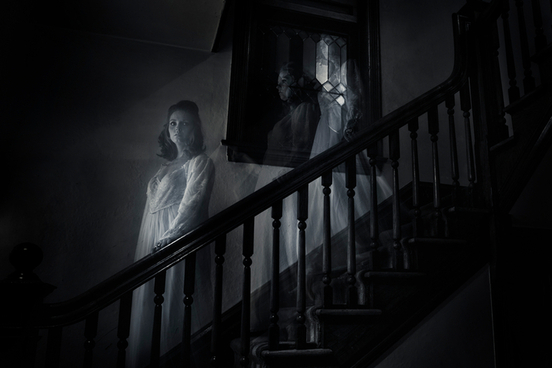
Apparition
Not all magical acts in the Harry Potter world involve telling the future. One tricky kind of magic that all Hogwarts students attempt to learn is apparition, or the act of magically moving from one place to another by disappearing from the current location to the desired location. It’s not an unregulated form of magical transportation: readers discovered in Harry Potter and the Goblet of Fire that a wizard or witch needs a license to Apparate (or, use Apparition).
Apparition is aptly named: the English word goes back to the 1500s and was first used to refer to the sudden appearance of supernatural beings:
...neither the sight thereof, nor the sight of all ye dead heades in ye charnel house, nor the apparicion of a very ghost, is halfe so grisely as the depe conceiued fantasy of deathe in his nature...
—Thomas More, De quatuor novissimis [On the Last Things], ca. 1522.
Apparition soon gained other meanings: it soon was applied to the spectral beings that suddenly appeared (“I thinke it is the weakenesse of mine eyes / That shapes this monstrous Apparition.” —William Shakespeare, Julius Caesar, ca. 1616); it can be used technically to refer to the sudden appearance of a celestial body after being hidden or occluded (“This is the start of Mercury's best apparition of the year for midnorthern readers.” —Fred Schaaf, Sky & Telescope, April 1995); or, indeed, of anything that seems to suddenly appear (“As a distant ridge is approached from afar, it may appear at first as an apparition on the horizon, then as a dark somber slope...” —Thomas & Geraldine Vale, U.S. 40 Today, 1983).
Apparition, in both the magical sense and the real-life sense, stems from a verb. Rowling’s Apparition is related to the magical verb apparate (which means “to perform Apparition”), and the mundane apparition comes ultimately the Latin verb apparere, which means “to appear.”
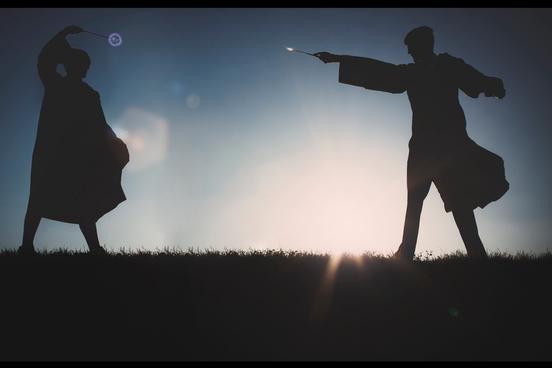
Transfiguration
“I do hope they start right away, there's so much to learn, I'm particularly interested in Transfiguration, you know, turning something into something else, of course, it's supposed to be very difficult...”
—Harry Potter and the Sorcerer’s Stone, 1998 (US release)
Transfiguration, or the magical art of changing one thing into another, is difficult and exacting work. Rowling herself states that it consists of altering the molecular makeup of something, and so is more exact and scientific that other forms of magic. Rowling took the name for this type of magic from an existing English word. But unlike magical transfiguration, the earliest real-world use of transfiguration referred to a great mystery:
Of the transfiguracioun of oure lord Jesu in the hille.
—The Mirrour of the Blessed Lyf of Jesu Christ ...Made Before the Year 1410 by Nicholas Love, ca. 1430
The Biblical transfiguration is detailed in the Gospels. Jesus takes three of his disciples up to a mountaintop where he is transfigured: his face shines, his clothing becomes white, and Moses and Elijah appear and talk with Jesus. The English transfigure comes from the Latin transfigurare which means “to change the shape of.”
Though the English transfiguration originally referred to Jesus’ external change (and the Christian feast day that celebrated this change), it soon came to refer to any great transformation or metamorphosis:
But Ihon Cade ... departed secretly in habite disguysed, into Sussex: but all his metamorphosis or transfiguracion, litle preuailed.
—Edward Hall, The vnion of the two noble and illustre famelies of Lancastre [and] Yorke, 1548
The original religious meaning of transfiguration is still the most common, but that may change. There’s little doubt that Rowling’s books have transfigured our language (and may yet transfigure transfiguration).
